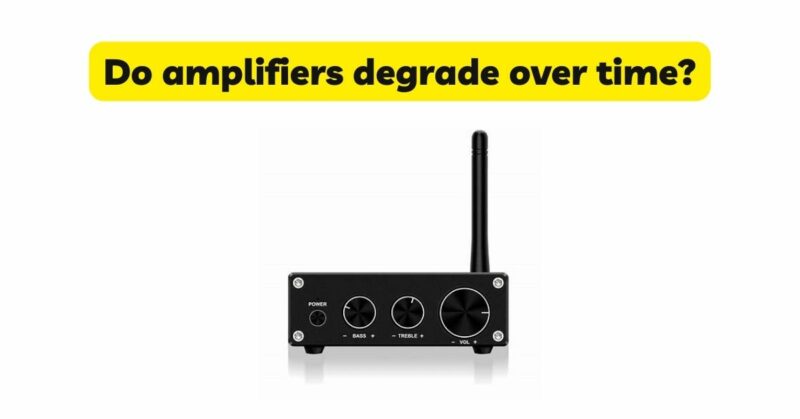Amplifiers are essential components of audio systems, providing the power and amplification needed to produce high-quality sound. Over time, electronic devices can experience degradation and performance issues due to various factors. In this article, we will explore the concept of amplifier degradation, the factors that contribute to it, and the steps audio enthusiasts can take to mitigate its effects. By understanding how amplifiers degrade over time, users can make informed decisions regarding maintenance, upgrades, and overall system longevity.
I. Components and Degradation:
- Passive Components: Amplifiers contain passive components such as capacitors, resistors, and inductors. Over time, these components can experience aging, leading to changes in their electrical properties. Capacitors, in particular, are susceptible to drying out, which can affect their performance and lead to increased distortion or reduced power output.
- Active Components: Active components like transistors and integrated circuits (ICs) can also degrade over time. Factors such as heat, voltage stress, and manufacturing defects can contribute to the degradation of active components, resulting in reduced performance or failure.
II. Environmental Factors:
- Temperature: High temperatures can accelerate the degradation of electronic components. Amplifiers that operate in hot environments or are subjected to prolonged periods of high heat may experience increased degradation and a shorter lifespan.
- Humidity: Moisture can corrode electronic connections and lead to oxidation, potentially causing malfunctions or failures in the amplifier. Operating amplifiers in excessively humid environments without proper protection can accelerate degradation.
III. Usage Patterns:
- Continuous Operation: Amplifiers that are left powered on continuously without adequate cooling or rest periods may experience accelerated degradation. Continuous operation puts additional stress on the components and can lead to increased heat buildup, reducing their lifespan.
- Volume Levels: Running an amplifier consistently at high volume levels can strain its components, particularly the power supply and output stages. Excessive strain can accelerate degradation and increase the likelihood of performance issues.
IV. Maintenance and Care:
- Dust and Debris: Dust and debris can accumulate inside amplifiers, impeding proper ventilation and causing components to heat up more than intended. Regular cleaning and maintenance can help prevent excessive heat buildup and mitigate degradation caused by dust accumulation.
- Electrical Power: Amplifiers are susceptible to power-related issues such as voltage spikes, surges, or unstable electrical supply. Using surge protectors or power conditioners can help safeguard amplifiers from these issues and minimize the risk of degradation.
V. Upgrades and Technological Advancements:
- Obsolescence: As technology advances, new features and technologies become available, surpassing the capabilities of older amplifier models. While degradation itself may not render an amplifier obsolete, the desire for enhanced features or improved sound quality can prompt users to upgrade their equipment.
- Lifespan Considerations: Amplifiers are designed with an expected lifespan in mind, taking into account the quality of components, circuitry, and usage patterns. Users may choose to upgrade their amplifiers after a certain period, even if the existing amplifier is still functional, to take advantage of newer technologies or features.
VI. Mitigating Amplifier Degradation:
- Proper Ventilation: Adequate airflow around the amplifier is crucial for heat dissipation. Ensuring the amplifier has sufficient space and is not enclosed in a tight cabinet can help prevent excessive heat buildup and reduce the risk of degradation.
- Regular Maintenance: Conducting routine cleaning, checking connections, and inspecting for signs of component aging can help identify and address degradation issues early on. Timely repairs or component replacements can extend the lifespan of the amplifier.
- Power Protection: Using surge protectors, voltage regulators, or power conditioners can safeguard amplifiers from power-related issues, reducing the risk of degradation caused by electrical problems.
- Rest Periods: Allowing amplifiers to rest periodically, especially after extended periods of use, can help dissipate heat and reduce the strain on components, ultimately mitigating degradation.
VII. Conclusion:
Amplifiers can degrade over time due to various factors, including component aging, environmental conditions, usage patterns, and lack of maintenance. By understanding the causes of degradation and implementing proper care and maintenance practices, users can mitigate the effects and extend the lifespan of their amplifiers. Regular cleaning, monitoring temperature and humidity levels, utilizing power protection devices, and considering upgrades when necessary are all essential steps to ensure optimal performance and longevity of amplifiers. By taking these precautions, audio enthusiasts can continue to enjoy the high-quality sound reproduction that amplifiers provide for years to come.


